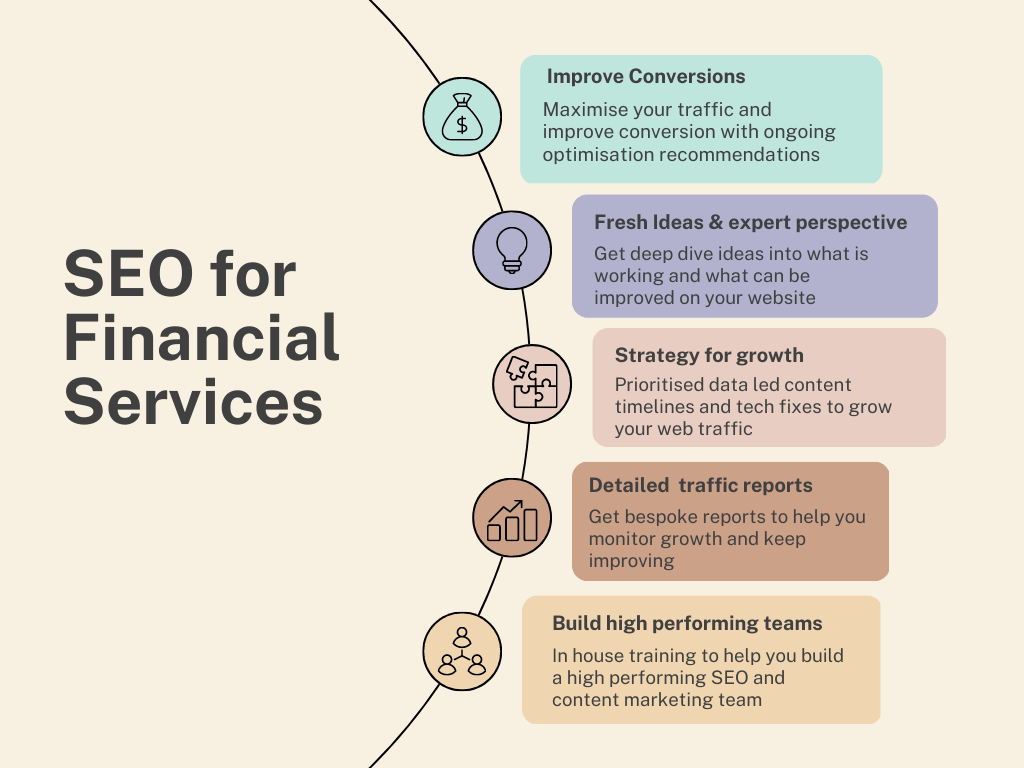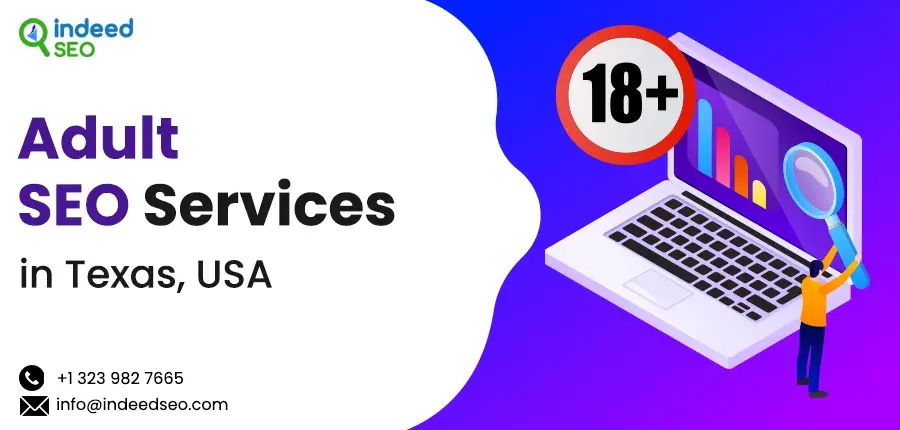SEO for Financial Services boosts online visibility, attracts potential clients, and enhances trust. It involves targeted keywords and quality content.
Financial services rely heavily on trust and credibility. SEO helps establish this by ensuring your website ranks high on search engines. High-ranking pages are perceived as more trustworthy and reliable. Incorporating relevant keywords, optimizing website speed, and creating valuable content are essential.
Engaging blogs, detailed service pages, and client testimonials can improve SEO. Local SEO is crucial for attracting nearby clients. Regularly updating content and staying informed about SEO trends maintains your competitive edge. SEO is a long-term investment that can significantly increase your client base and online presence.
The Importance Of Seo In Fintech
The FinTech industry is booming, and SEO has become essential for success. Financial services are increasingly moving online. Companies must adapt to this digital transformation. SEO helps FinTech firms reach their target audience effectively.
Why Visibility Matters
In the digital age, visibility is everything. Customers use search engines to find financial services. If your website doesn’t rank high, you lose potential clients. SEO ensures your site appears in top search results. This increases traffic and boosts credibility.
High visibility can lead to increased customer trust. People trust search engines to provide reliable information. If your FinTech service ranks high, it appears more trustworthy.
Comparing Traditional Vs. Digital Financial Services
| Aspect | Traditional Financial Services | Digital Financial Services |
|---|---|---|
| Accessibility | Limited to physical locations | Available 24/7 online |
| Cost | Higher operational costs | Lower operational costs |
| Speed | Slower due to manual processes | Faster with automation |
| Customer Reach | Local or regional | Global reach |
Traditional financial services rely on physical branches. Digital financial services, on the other hand, operate online. This makes them more accessible and cost-effective.
The speed of digital services is another advantage. Automation and online processes are faster. Traditional services often involve manual steps, slowing things down.
Finally, digital financial services have a global reach. Traditional services are usually limited to local areas. This makes SEO crucial for digital financial services. It helps them reach a wider audience.

Credit: outreachmonks.com
Key Seo Strategies For Financial Services
Financial services need strong SEO strategies to reach more clients. Effective SEO helps financial institutions gain visibility. This section covers the main strategies to boost your SEO efforts.
Optimizing For Local Search
Local search optimization is crucial for financial services. Clients often look for local financial advisors or banks. Use Google My Business to list your services. Ensure your business address, phone number, and hours are correct.
Include local keywords in your website content. For example, “best financial advisor in New York”. Also, gather reviews from local clients. Positive reviews enhance local search rankings.
Leveraging Financial Keywords
Financial keywords are essential for SEO. Identify keywords relevant to your services. Use tools like Google Keyword Planner. Focus on keywords with high search volume and low competition.
Incorporate these keywords naturally into your content. Avoid keyword stuffing. Use them in headings, meta descriptions, and image alt texts. This practice improves your search engine ranking.
Creating Quality Content
Quality content attracts and engages clients. Write informative blogs and articles. Focus on topics that interest your target audience. Examples include “investment tips” or “how to save for retirement”.
Use bullet points and tables to present information clearly. High-quality content helps build trust. Search engines reward valuable content with higher rankings. Regularly update your content to keep it fresh and relevant.
| SEO Strategy | Action |
|---|---|
| Local Search | Use Google My Business |
| Financial Keywords | Identify and use relevant keywords |
| Quality Content | Create informative and engaging articles |
Technical Seo For Fintech Websites
Technical SEO is vital for FinTech websites. These sites handle sensitive financial data. Ensuring the best user experience and security is key. Let’s explore some critical aspects of technical SEO.
Improving Site Speed
Site speed is crucial for FinTech websites. Users expect fast loading times. Slow sites can lead to high bounce rates. Here are some tips to improve site speed:
- Optimize images for faster loading.
- Use browser caching to reduce load time.
- Minimize CSS, JavaScript, and HTML files.
- Use a Content Delivery Network (CDN).
A fast website improves user experience and search engine ranking. Google considers page speed in its ranking algorithm.
Mobile Optimization
Mobile optimization is essential for FinTech websites. Many users access financial services on mobile devices. Here are some tips for mobile optimization:
- Use a responsive design that adjusts to different screen sizes.
- Ensure buttons and links are easy to tap.
- Reduce pop-ups and interstitials.
- Optimize images and videos for mobile.
Mobile-friendly websites rank better on search engines. Google uses mobile-first indexing. This means Google primarily uses the mobile version of a site for ranking.
Secure Sockets Layer (ssl) Certificates
SSL certificates are non-negotiable for FinTech websites. They encrypt data between the user’s browser and the server. Here are some key points about SSL certificates:
- SSL certificates protect sensitive financial data.
- They build trust with users, showing your site is secure.
- Google gives ranking boosts to HTTPS sites.
- Regularly update and renew your SSL certificates.
An SSL certificate is indicated by “HTTPS” in the URL. It ensures data protection and builds user trust.

Credit: raddinteractive.com
Content Marketing In Financial Services
Content marketing is crucial for financial services. It helps build trust, authority, and engagement with your audience. Through well-planned content, financial institutions can educate their clients and prospects.
Blogging For Authority
Blogging is a powerful tool for financial services. It helps position your brand as an authority in the field. Regularly updated blogs improve search engine rankings. They also keep your audience informed about industry trends and insights.
Consider the following types of blog content:
- Market Analysis: Discuss recent market changes and their impacts.
- Case Studies: Showcase successful financial strategies.
- How-to Guides: Provide step-by-step financial advice.
Educational Resources
Offering educational resources is vital for financial services. These resources help clients make informed decisions.
Effective educational content includes:
| Type | Description |
|---|---|
| Whitepapers | In-depth reports on financial topics. |
| E-books | Comprehensive guides covering financial planning and investment strategies. |
| Webinars | Live sessions discussing current financial trends. |
Video Content
Video content is increasingly popular. It is an engaging way to convey complex financial concepts. Videos can simplify difficult topics and make them more accessible.
Types of video content to consider:
- Explainer Videos: Break down financial concepts in simple terms.
- Client Testimonials: Share success stories from satisfied clients.
- Live Q&A Sessions: Address common financial questions in real-time.
Using these content marketing strategies can significantly enhance your online presence. They will also help you connect better with your audience.
Leveraging Social Media For Seo
Social media can significantly enhance SEO for financial services. It improves visibility, drives traffic, and boosts engagement. By leveraging social media, financial firms can strengthen their online presence and attract more potential clients.
Choosing The Right Platforms
Not all social media platforms are suitable for financial services. LinkedIn is ideal for B2B interactions and professional networking. Twitter helps in sharing timely updates and financial news. Facebook is useful for reaching a broader audience and engaging with clients.
Here is a comparison of platforms:
| Platform | Best Use | Audience |
|---|---|---|
| Professional networking, B2B | Business professionals | |
| Timely updates, news | General public | |
| Broad engagement, client interaction | General public |
Engagement Strategies
Engagement is crucial for leveraging social media for SEO. Respond to comments and messages promptly. Share relevant, educational content that adds value to your audience.
Here are some effective engagement strategies:
- Host webinars and live Q&A sessions
- Share client testimonials and success stories
- Use polls and surveys to interact with your audience
Paid Vs. Organic Reach
Organic reach involves growing your audience naturally through valuable content and engagement. It is cost-effective but takes time. Paid reach involves using ads to target specific demographics. It provides quicker results but requires a budget.
Consider these factors when choosing between paid and organic reach:
- Budget: Paid reach requires a financial investment.
- Time: Organic reach takes longer to show results.
- Goals: Use paid reach for specific, short-term goals.
Both strategies can be effective when used together. A balanced approach often yields the best results.

Credit: www.pagetraffic.in
Local Seo For Financial Services
Local SEO is vital for financial services that aim to attract clients within a specific area. By optimizing your online presence for local searches, you can increase visibility and attract more local clients. Let’s explore some key elements of local SEO for financial services.
Google My Business
Google My Business (GMB) is a powerful tool for local SEO. It allows you to manage your online presence across Google, including Search and Maps. Ensure your GMB profile is complete and up-to-date.
- Business Name: Use your actual business name.
- Address: Make sure your address is accurate and consistent.
- Phone Number: Provide a local phone number.
- Categories: Choose relevant categories for your business.
- Photos: Upload high-quality photos of your office and team.
Encourage clients to leave reviews on your GMB profile. Positive reviews improve your local ranking and attract more clients.
Local Keywords
Incorporating local keywords into your content is crucial. These are search terms that include your location and the services you offer.
| Service | Local Keyword Example |
|---|---|
| Financial Planning | Financial Planner in New York |
| Tax Services | Tax Services Los Angeles |
| Investment Advice | Investment Advisor Chicago |
Use these keywords in your website content, meta descriptions, and blog posts. This helps search engines understand your location and services.
Reviews And Ratings
Reviews and ratings are essential for building trust and credibility. Encourage satisfied clients to leave positive reviews on your website and Google My Business profile.
Respond to all reviews, both positive and negative. Thank clients for positive feedback and address any concerns in negative reviews. This shows you value client feedback and are committed to improving your services.
High ratings and positive reviews can significantly boost your local SEO, helping you attract more local clients.
Measuring Your Seo Success
Measuring the success of your SEO strategy is crucial, especially for financial services. Tracking your progress helps refine your tactics and improve results. This section will guide you through the key aspects of measuring your SEO success.
Key Performance Indicators (kpis)
Tracking Key Performance Indicators (KPIs) is essential. KPIs provide a clear picture of your SEO efforts. Here are some important KPIs for financial services:
- Organic Traffic: The number of visitors coming from search engines.
- Conversion Rate: The percentage of visitors who complete a desired action.
- Keyword Rankings: Your position in search engine results for targeted keywords.
- Backlinks: The number and quality of external links pointing to your site.
- Click-Through Rate (CTR): The ratio of users who click on your link to the number of total users who view it.
Tools For Tracking Seo
Using the right tools can make tracking easier and more effective. Here are some essential tools:
| Tool | Function |
|---|---|
| Google Analytics | Tracks website traffic and user behavior. |
| Google Search Console | Monitors site performance in search results. |
| SEMrush | Provides keyword tracking and competitive analysis. |
| Ahrefs | Tracks backlinks and keyword rankings. |
Adjusting Your Strategy
Reviewing your KPIs and tool data helps you adjust your strategy. Here are steps to refine your approach:
- Analyze Data: Regularly review your KPIs and tool insights.
- Identify Weaknesses: Find areas where your site is underperforming.
- Implement Changes: Make data-driven adjustments to your content and SEO tactics.
- Monitor Results: Track the impact of your changes over time.
Constantly refining your strategy ensures sustained SEO success for financial services.
Future Trends In Fintech Seo
The financial technology (FinTech) sector constantly evolves, driven by innovation and technology. As FinTech companies grow, their digital presence becomes crucial. Search Engine Optimization (SEO) is a key player in this transformation. Understanding future trends in FinTech SEO can help businesses stay ahead.
Voice Search Optimization
Voice search is growing rapidly. More people use devices like Alexa and Siri. FinTech companies must optimize for voice search. This means focusing on natural language and long-tail keywords.
Consider these tips for voice search optimization:
- Use conversational language
- Answer common questions clearly
- Optimize for local searches
Here is a simple example:
Voice Search: "What are the best investment options for 2023?"
Artificial Intelligence And Seo
Artificial Intelligence (AI) is revolutionizing SEO. AI tools can analyze large datasets quickly. They help in predicting trends and user behaviors. This allows FinTech companies to create more targeted content.
Here are some benefits of AI in SEO:
| Benefit | Description |
|---|---|
| Content Optimization | AI tools suggest improvements for better ranking. |
| Keyword Research | AI identifies high-value keywords with ease. |
| User Experience | AI improves site navigation and user engagement. |
The Role Of Blockchain
Blockchain technology is not just for cryptocurrencies. It plays a significant role in SEO for FinTech. Blockchain ensures data transparency and security. This builds trust with users and search engines.
How Blockchain impacts SEO:
- Data Transparency: Search engines trust transparent data.
- Security: Secure websites rank higher.
- User Trust: Users prefer secure platforms.
With blockchain, FinTech companies can enhance their SEO strategy effectively.
Frequently Asked Questions
What Does Seo Stand For In Finance?
SEO in finance stands for Search Engine Optimization. It involves optimizing financial websites to rank higher on search engines. This boosts visibility and attracts more traffic. Effective SEO can enhance online presence, increase leads, and drive growth in the financial sector.
What Is Seo In Fintech?
SEO in Fintech optimizes content to rank higher on search engines. It targets keywords related to financial technology, attracting relevant traffic.
What Does Seo Mean In Investment Banking?
SEO in investment banking stands for “Sell-Side Equity Research. ” It involves analyzing and recommending stocks to clients.
What Is The Meaning Of Seo In Banking?
SEO in banking refers to optimizing a bank’s online content to rank higher in search engine results. It enhances visibility, attracts potential customers, and promotes financial services effectively.
Conclusion
Mastering SEO for financial services can significantly boost your online presence. Focus on relevant keywords and quality content. Regularly update your website and monitor performance. By implementing these strategies, you’ll attract more clients and stay ahead of competitors. Invest in SEO today to ensure long-term success in the financial sector.


